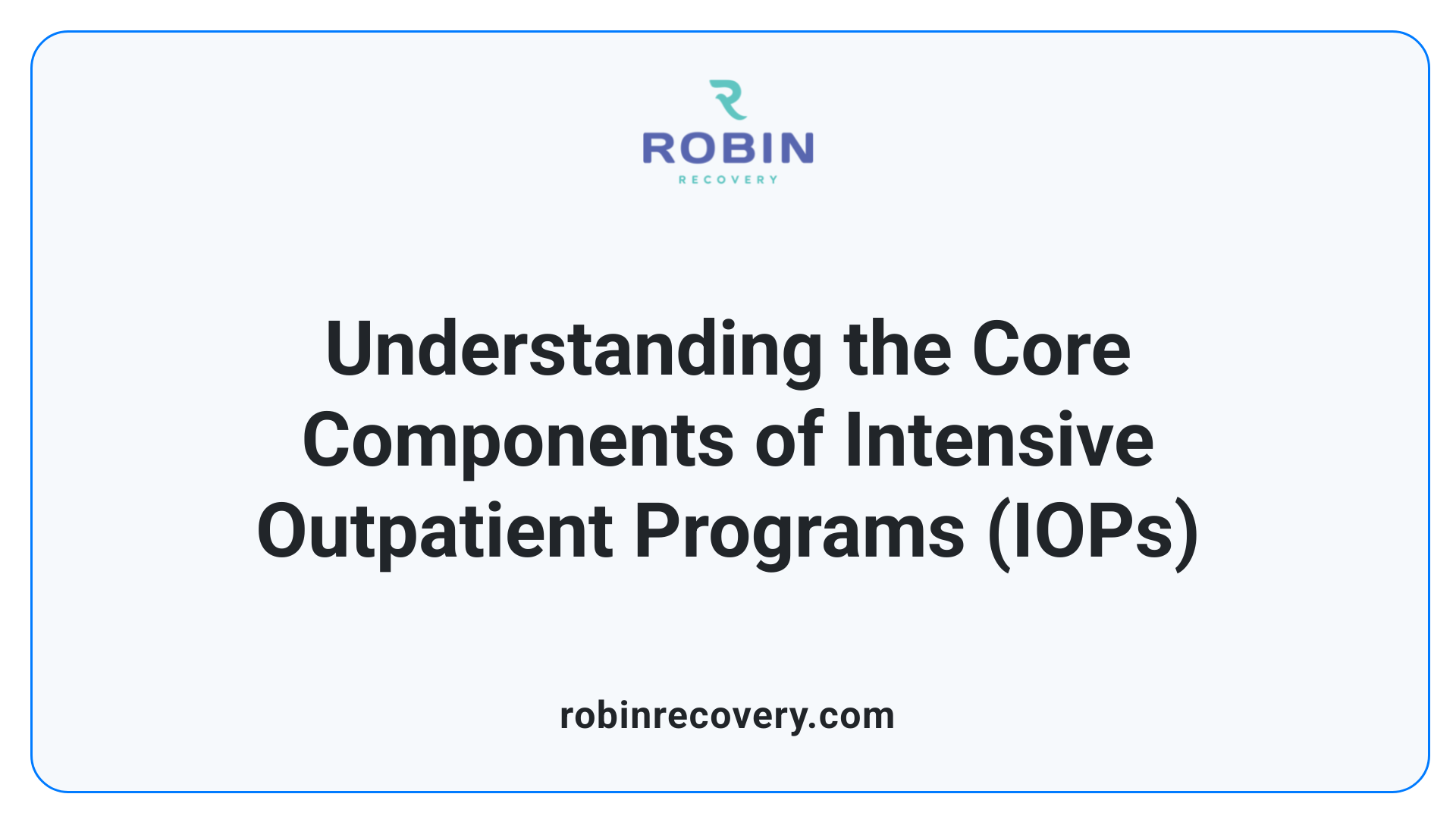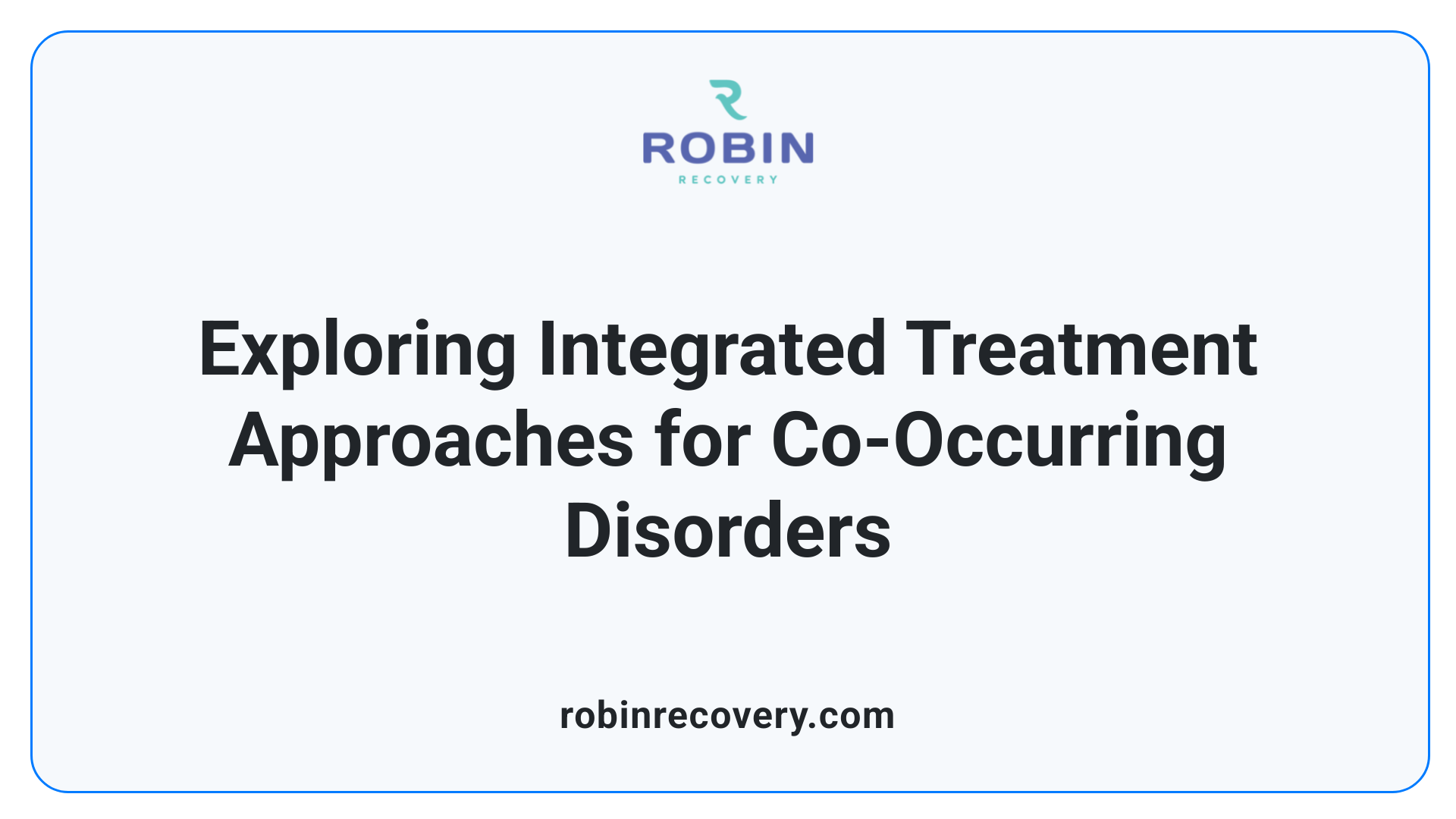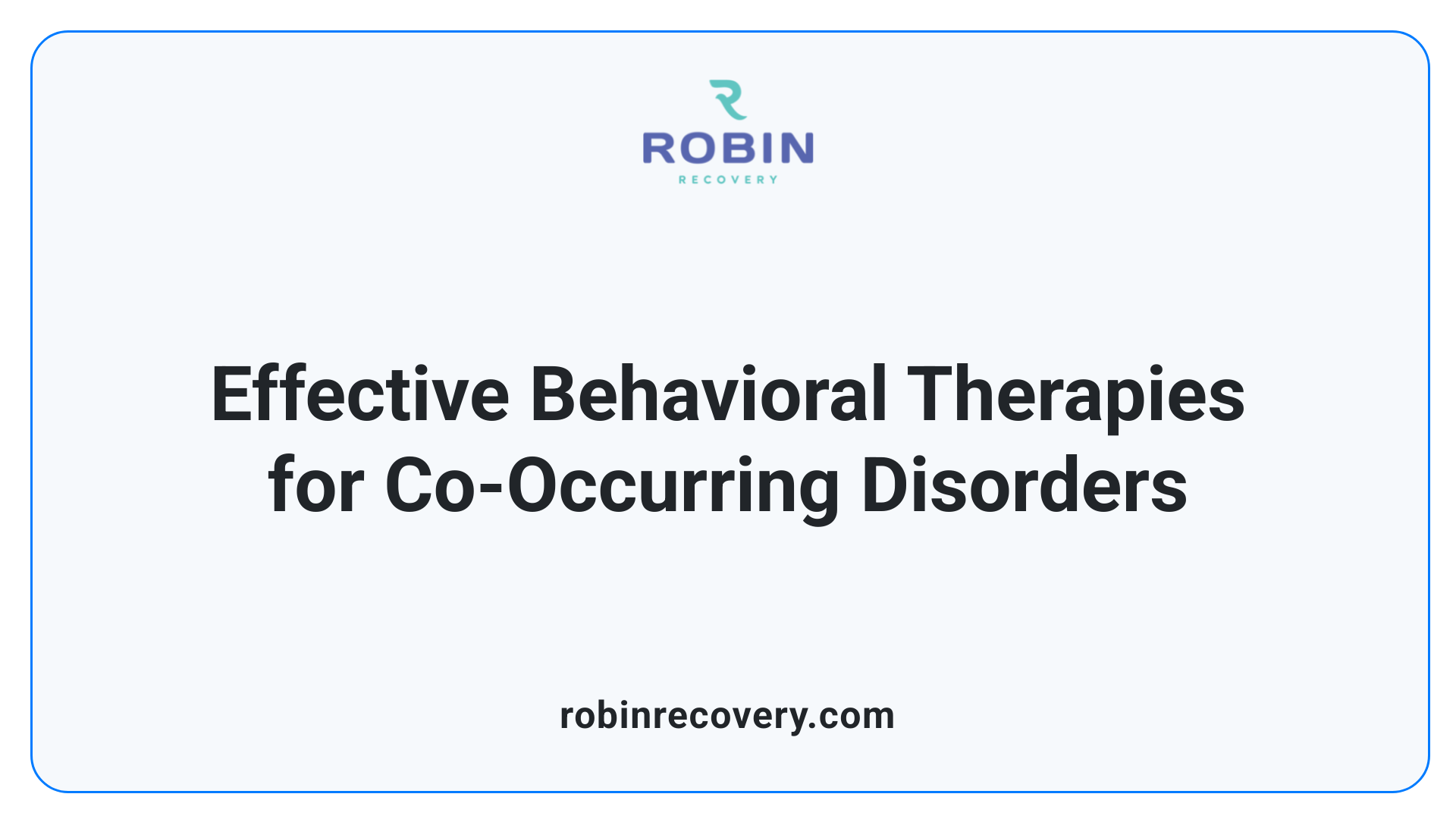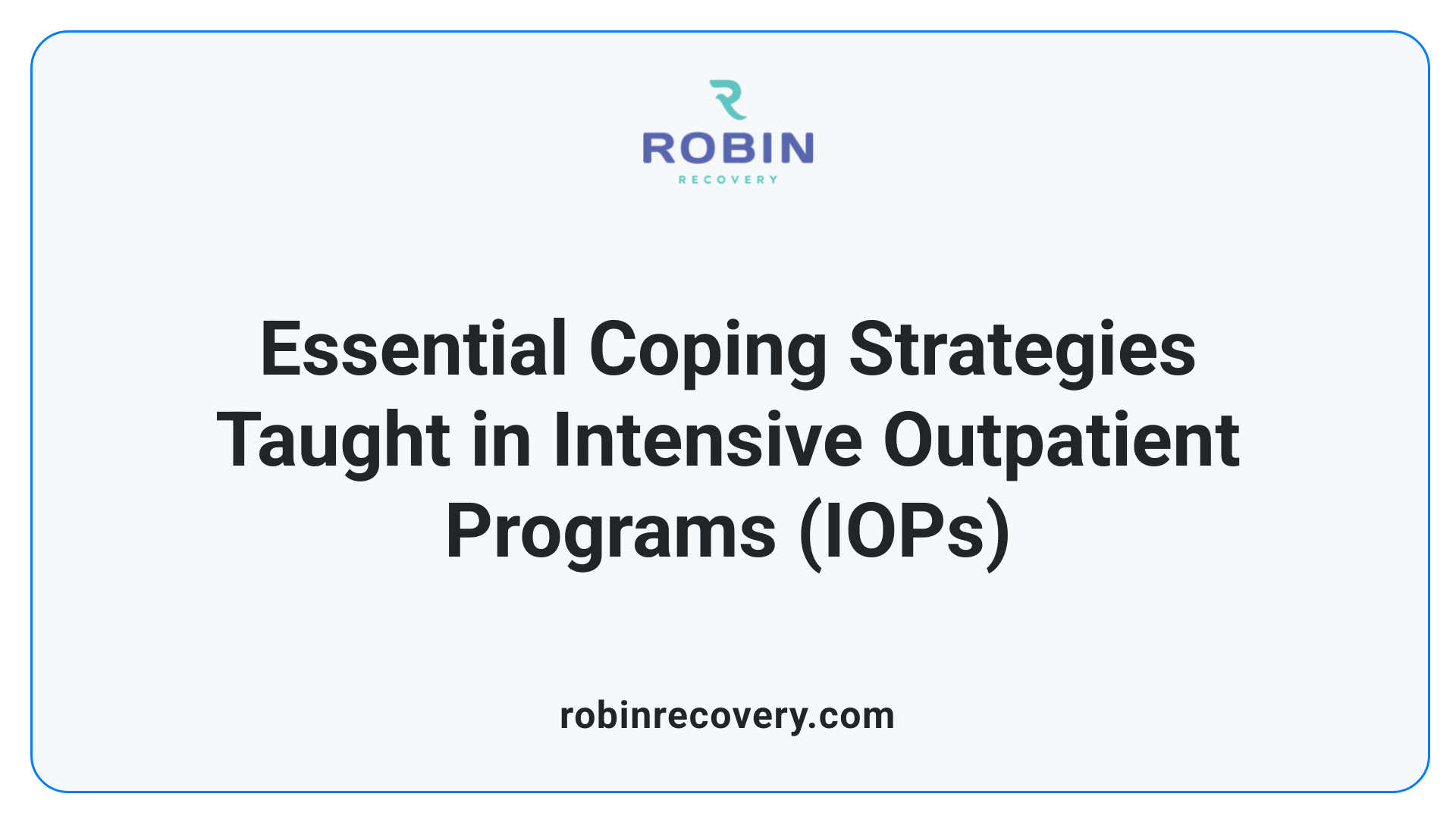How Intensive Outpatient Programs Support Clients with Co-Occurring Disorders

Understanding the Crucial Role of IOPs
For individuals grappling with the dual challenge of substance use and mental health disorders, known as co-occurring disorders, finding an effective treatment strategy is critical. Intensive Outpatient Programs (IOPs) have emerged as a lifeline, offering a structured yet flexible treatment option. Through a combination of evidence-based therapies and robust support systems, IOPs help individuals manage these intricate issues while maintaining their daily lives. This article delves into how IOPs are uniquely suited to treat co-occurring disorders, focusing on their structure, therapeutic approaches, and efficacy.
Components and Purpose of IOPs

What is an Intensive Outpatient Program (IOP) and what is its purpose?
An Intensive Outpatient Program (IOP) provides structured treatment for individuals grappling with mental health issues and substance use disorders. It is designed to assist patients in achieving stability while allowing them to live at home and maintain their daily routines. This program is especially advantageous for those transitioning from inpatient care or experiencing recent declines in functioning.
IOPs offer a comprehensive suite of services that includes:
- Individual Therapy: One-on-one sessions focusing on personalized needs and coping strategies.
- Group Therapy: Facilitated sessions that promote shared experiences and social support, enhancing interpersonal dynamics.
- Medication Management: Oversight of necessary medications tailored to individual health profiles.
- Educational Sessions: Psychoeducation sessions designed to inform clients on mental health and addiction, equipping them with essential knowledge for recovery.
The primary goal of IOPs is to reduce the likelihood of future hospitalizations. By providing a safe, structured environment, they empower patients to develop coping skills, strengthen social systems, and establish routines that integrate effectively into their lives. Typically, participants engage in programming for several hours a week, which reinforces community ties while supporting their recovery efforts.
Integrated Treatment Models for Dual Diagnosis

Which treatment model is recommended for clients with co-occurring disorders?
An integrated treatment model is highly recommended for clients with co-occurring disorders. This model facilitates treatment for both substance use and mental health issues concurrently, ensuring that individuals receive comprehensive care tailored to their unique needs.
Central to this approach is the Certified Community Behavioral Health Clinic (CCBHC) model, which promotes coordinated, community-based care. Various evidence-based practices under this model include Medication-Assisted Treatment (MAT) for managing substance use disorders, as well as Cognitive Behavioral Therapy (CBT) and Dialectical Behavioral Therapy (DBT) to address underlying emotional and cognitive challenges.
Additional strategies like Motivational Interviewing and Screening, Brief Intervention, and Referral to Treatment (SBIRT) are utilized to enhance client engagement and facilitate early interventions. Implementing these diverse therapeutic techniques within outpatient programs is essential for nurturing long-term recovery and resilience among individuals dealing with these complex challenges.
Importance of integrated care
The significance of integrated care in treating co-occurring disorders cannot be overstated. By addressing both addiction and mental health issues simultaneously, integrated care leads to improved treatment outcomes. Research indicates that individuals receiving concurrent treatment have higher success rates in managing their conditions and lower relapse rates compared to those who address each disorder separately.
A well-structured program provides regular therapy sessions—typically a minimum of nine hours per week—that include various formats like group therapy and individual counseling. This structure fosters skill development and coping strategies crucial for navigating real-world challenges after treatment, enhancing patients' chances of achieving sustainable recovery.
Creating a Welcoming Therapeutic Environment

Why is it important to approach clients with co-occurring disorders in a welcoming manner?
Creating a welcoming therapeutic environment is vital, particularly for clients with co-occurring disorders. These individuals often confront stigma and experience mistrust towards treatment, making a positive therapeutic alliance a crucial component of effective care. When counselors approach clients with empathy and understanding, they can help build the trust necessary for productive engagement in the treatment process.
Tailoring approaches to focus on clients' strengths and goals—rather than solely on their diagnoses—further enhances treatment outcomes. By fostering collaboration and creating a supportive environment, counselors empower clients to take an active role in their recovery journey. A warm and inviting space allows for open communication, which is essential for addressing the complexities these individuals face.
Impact on treatment outcomes
The significance of a welcoming approach extends to overall treatment outcomes. Research indicates that a strong therapeutic alliance significantly predicts treatment retention, symptom reduction, and increased self-efficacy among clients dealing with substance use and mental health issues. In this context, a positive alliance can reduce feelings of isolation, facilitating peer connections that enhance recovery.
By reinforcing a sense of community and connection, therapy becomes more effective, contributing to clients achieving sustained recovery. Ultimately, the combination of a supportive therapeutic environment and an emphasis on collaboration leads to improved outcomes for those navigating the intertwined challenges of co-occurring disorders.
Components of a Supportive Therapeutic Environment Benefits Outcome Positive therapeutic alliance Builds trust and engagement Higher treatment retention Empathetic approach Reduces stigma and fear Improved self-efficacy Tailored care focusing on strengths Enhances client confidence Better coping strategies Community support and connection Diminishes isolation Sustained recovery
Behavioral Therapies in IOPs

What types of therapy are effective for treating co-occurring disorders?
Effective therapies for treating co-occurring disorders include various behavioral therapies like Cognitive Behavioral Therapy (CBT) and Dialectical Behavioral Therapy (DBT). CBT focuses on helping individuals identify and modify dysfunctional thought patterns that contribute to mental health issues and substance use. This process is crucial as it empowers clients to better manage their triggers and develop healthier coping strategies.
DBT, on the other hand, is designed to improve emotional regulation and interpersonal effectiveness. It offers clients tools to cope with intense emotions, which can significantly impact their recovery journey. Together, these therapies form a robust foundation for addressing the complexities of co-occurring disorders.
Medication management is another critical component of treatment. It targets specific symptoms related to either mental health or substance use disorders, ensuring that individuals receive comprehensive care. Support groups, which foster peer interactions and shared experiences, also play a vital role in maintaining recovery.
Role of CBT and DBT in IOPs
In IOPs, CBT and DBT are integrated into treatment plans, allowing participants to engage in structured therapy sessions several times per week. This consistent engagement is essential in fostering a supportive environment where clients can discuss their challenges openly.
Both CBT and DBT also emphasize skill-building, equipping clients with strategies to handle stress and cravings effectively. By promoting self-efficacy and resilience, these therapeutic approaches are vital in helping individuals navigate their recovery while addressing both substance use and mental health concerns. The structured support provided in an IOP setting enhances the effectiveness of these therapies, making them essential tools for achieving long-term recovery.
The Structure and Flexibility of IOPs
Accessibility of IOPs
Intensive Outpatient Programs (IOPs) offer a unique solution for individuals seeking recovery from substance use and mental health disorders. This format allows clients to live at home while receiving a higher level of care than traditional outpatient therapy. IOPs typically require at least 9 hours of structured therapy each week, encompassing individual counseling, group sessions, and family involvement. This combination of services is designed with flexibility in mind, accommodating various schedules and responsibilities.
Additionally, many IOPs now provide virtual therapy options, making access even easier. Participants can connect with therapists from the comfort of their homes, reducing barriers that may prevent them from attending in-person sessions. This flexibility helps individuals maintain their daily routines while engaging in essential treatment.
Balancing treatment with daily life
The design of IOPs is particularly beneficial for clients who are managing personal or professional commitments. Sessions are often scheduled during evenings or weekends, allowing individuals to balance treatment alongside work, school, or family responsibilities.
Furthermore, IOPs emphasize the development of coping strategies, empowering clients to integrate their therapeutic skills into everyday situations. This approach not only supports their recovery journey but ensures they remain engaged with their community, enhancing their overall support system throughout treatment.
Family Involvement in IOPs
Role of family support in recovery
Family support plays an integral role in the recovery process for individuals participating in Intensive Outpatient Programs (IOPs). Engaging family members fosters a supportive atmosphere that aids in healing. The shared experiences between clients and their loved ones can enhance communication and strengthen relationships, which are vital components of successful recovery.
Family involvement also allows for the identification of triggers and stressors that may affect the client’s journey. By educating family members on addiction and co-occurring disorders, they can better understand their loved one's experiences and provide appropriate encouragement and accountability.
Family counseling in IOPs
Many IOPs incorporate family counseling sessions into their programs. Through these sessions, families can learn about the dynamics of addiction and co-occurring mental health disorders. These therapeutic settings provide a safe space for discussing challenges and establishing healthier communication patterns.
This collaborative approach not only enhances the client's support network but also empowers family members with tools to aid in the recovery process. Family counseling is often tailored to address specific situations and needs, ensuring each participant plays a constructive role in healing.
Evidence Supporting IOP Effectiveness
Research Findings on IOP Outcomes
Intensive Outpatient Programs (IOPs) have established themselves as effective treatment options for individuals facing substance use and co-occurring mental health disorders. Comprehensive research indicates that participants in IOPs report significant improvements in their conditions, often comparable to those achieved in inpatient settings. For example, studies show substantial reductions in self-reported substance use, as well as improvements in symptoms of anxiety, depression, and PTSD following IOP treatment.
Furthermore, IOPs focus on personalized care that addresses the unique needs of each client, leading to higher retention rates and better recovery outcomes. These programs typically require a minimum of nine hours of structured therapy per week, which includes group and individual counseling as well as skill development sessions to manage real-world challenges.
Comparison with Residential Treatment
Evidence suggests that IOPs can produce similar success rates as traditional residential programs. Clients often maintain their daily routines while receiving intensive care, making IOPs a more flexible option for those who do not require 24-hour supervision. This balance allows individuals to engage with their community and leverage family support—critical factors in the recovery process.
Moreover, IOPs cater to individuals with co-occurring disorders by offering simultaneous treatment for substance use and mental health conditions, which can significantly enhance overall recovery efforts. The integration of evidence-based practices such as Cognitive Behavioral Therapy (CBT) and Dialectical Behavior Therapy (DBT) within these programs supports clients in developing coping mechanisms, ultimately promoting sustained sobriety and improved mental health.
Community Integration and Peer Support
Importance of Social Support in Recovery
Social support plays a vital role in the recovery journey for individuals with co-occurring mental health and substance use disorders. Programs like Intensive Outpatient Programs (IOPs) focus on creating a supportive environment where participants can share their experiences. This communal aspect not only reduces feelings of isolation, which commonly accompany mental health issues, but also fosters motivation and accountability among peers. Together, clients navigate challenges while learning effective coping strategies to manage triggers experienced during their daily lives.
Peer Connections in IOP Settings
Peer support is an essential component of IOPs, significantly enhancing recovery outcomes. Engaging in activities such as group therapy provides clients with opportunities to connect with others facing similar struggles. This shared experience helps to normalize their journey, reduce stigma, and reinforce the understanding that healing doesn't have to happen alone. Expert evaluations show that the presence of strong peer connections leads to greater treatment retention and improved self-efficacy in managing their conditions, ultimately paving the way for sustained recovery over time.
Skill Development in IOPs

Coping strategies taught in IOPs
Intensive Outpatient Programs (IOPs) play a crucial role in equipping individuals with vital coping strategies necessary for managing their mental health and substance use challenges. Participants are taught practical skills such as:
- Stress Management: Techniques to identify stressors and implement healthy coping mechanisms.
- Emotional Regulation: Strategies to effectively manage and express emotions, reducing the likelihood of relapse.
- Effective Communication: Skills to improve interpersonal interactions, essential for nurturing supportive relationships.
These coping strategies are integrated into therapy sessions, allowing clients to practice in a supportive environment before applying these skills in their everyday lives.
Long-term management of co-occurring disorders
IOPs focus on providing tools that facilitate the long-term management of co-occurring disorders. This includes:
- Relapse Prevention: Clients learn to recognize triggers and develop action plans to avoid relapse.
- Ongoing Support: A strong social network among peers offers essential encouragement throughout recovery.
- Therapeutic Techniques: Continued engagement in therapies such as Cognitive Behavioral Therapy (CBT) and Dialectical Behavior Therapy (DBT) enhances their ability to cope with stress and manage symptoms effectively.
The combination of these elements fosters a supportive environment, crucial for sustaining recovery and improving overall well-being.
Concluding Thoughts on IOPs for Co-Occurring Disorders
Intensive Outpatient Programs stand out as an essential intervention for those confronting the intertwined hurdles of mental health and substance use disorders. By offering a comprehensive treatment environment that integrates several therapeutic methodologies, IOPs provide a lifeline for individuals seeking stability without isolating them from their daily lives. The success stories and empirical data collectively underscore the significance of addressing both mental health and addiction issues concurrently, highlighting IOPs as a crucial pathway to recovery for many people managing these complex disorders. For those grappling with dual diagnoses, IOPs enable access to essential resources that nurture personal growth and resilience, paving the way for a sustained recovery journey.
References
- How Does IOP Benefit Treatment for Co-Occurring Disorders?
- Working With Co-occurring Disorders in Intensive Outpatient Programs
- Substance Abuse Intensive Outpatient Programs: Assessing the ...
- A Guide to Adult Intensive Outpatient Programs (IOP)
- Dual Diagnosis Intensive Outpatient Program (IOP) - UCLA Health
- Intensive Outpatient Program for Adults with Substance Abuse
- Co-Occurring Disorders Intensive Outpatient Program
